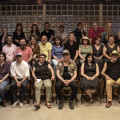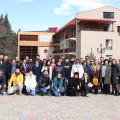What myths did this recent Artsakh War destroy for you as a writer?
In the mid-1990s, it was difficult to resist the myths in Armenia about ethnic superiority or supernatural ability, especially when you’re a 13-year-old adolescent and your army—smaller in number and poorly equipped—has managed to achieve incredible victories on the battlefield. But those myths had not yet managed to take root in my young mind when they were cracked into bits by one of the people responsible for those legendary victories—Monte Melkonyan himself. When, one day in 1993, Armenian Minister of Defense Vazgen Manukyan asked him during a televised interview to mention one of the factors for our military success, Monte said, “We are fools, but they are even bigger fools.”
Whether this was true or exaggerated, appropriate or impolite, it was a wake-up call. And although Monte’s words were simply a metaphor describing the state of affairs at a given time, I think that it grew more rigid over the years, turning into a less arrogant, but nonetheless immutable myth. If not about the superiority of the Armenians, it was a myth that elaborated the everlasting inferiority of the other side, their deficiency. The rubble left by the Second Artsakh War included that myth, as well.
After this recent war, I wondered whether there was any high-ranking Azerbaijani military officer that would have the courage or opportunity to describe their own victory in such terms. When one is allowed to broadcast such self-deprecating thoughts on Azerbaijani television, our peoples will be much closer to peace.
The third article of the PEN Charter mentions peace, good understanding between nations, and respect. How realistic is this after the war?
There is probably never a peace that was not preceded by a war. And so, peace is not just realistic, it is essentially a postwar phenomenon. It is another matter that our war has not yet reached its final conclusion. This is evidenced by the numerous Armenian prisoners of war, whom Aliyev’s belligerent regime continues to hold in Baku in inhuman conditions. The Second Artsakh War was not followed by peace, it was a merging of the two situations – I would call it khagherazm in Armenian, the first half of the Armenian word for “peace” followed by the second half of the word for “war”. And, overall, the history of the past 30 years in our region has been one of khagherazm and pataghutyun (roughly translated as par and weace). The traumas and wounds had already been high in number before the second war, which in turn multiplied it several times over. There is no simple solution. But if nothing is done about the belligerent state propaganda and if it is not replaced by a dialogue between the peoples, or at least a mutual effort to find a dignified reconciliation, those traumas will only keep multiplying. As a counterargument to this, one can think of the abundant dialogue that did exist between our peoples during Soviet times, but which ended eventually in the bloodshed of war. Can this alone serve as a rationale to close the window to dialogue?
Can a writer’s words and text play a role in peacebuilding initiatives and succeed? Will these words be understood and accepted?
For decades, everything was done, particularly by the authoritarian Aliyev regime, to limit the interaction and mutual understanding between our peoples, and to sow the seeds of hate. During that period of hate for Armenians propagated by Aliyev, Kocharyan had presented the hypothesis, absurd by any scientific standards, that Armenians and Azerbaijanis were genetically incompatible. Ignorance breeds all kinds of monsters. Today, our peoples are armed to the teeth with ignorance about each other and with that weapon they fire hatred at each other. Literature can issue a challenge to anything, and that monster is no exception. Whether this will succeed or be accepted is another issue, and this is quite unpredictable. In this sense, I’d like to bring an example from my own experience.
After the April 2016 clashes, I extended a hand of collaboration to the exiled Azerbaijani author Alekper Aliyev with the aim of having Azerbaijani translations of several sections of the experimental novel Aterazma, the title of which is a play on words, modifying the Armenian word for “war” (paterazm) to include the meaning of “hate” by beheading the first letter. An attempt is made, in Aterazma, to seek out the human hiding in the shelter of national identity and to expose the existing interethnic hate, imagining an opportunity for dialogue which is, albeit, doomed to failure. That book first caused some bewilderment among readers in Armenia (particularly because of its obscure experimental nature) and was well received by only a very small circle of people. Even though the book was written in untranslatable Armenian, it was also meant for the Azerbaijani reader, but no opportunities came about for a dialogue with them. During the Second Artsakh War, when I saw the armenophobic writings of that very same Alekper Aliyev as well as his postwar admiration of the fascist park that opened in Baku to display their war trophies sporting dehumanizing scenes with wax mannequins of dead or frightful Armenian soldiers, I felt disgusted at the thought of our literary collaboration.
But I experienced immense surprise and satisfaction when, months after the war, I learned that Aterazma had finally served as a paper bridge for dialogue between Armenians and Azerbaijanis. And, thanks to this conversation between Samira Alakbarli and Arakel Minassian, I discovered the organization Caucasus Talks, which is a promising new platform that arranges discussions on the complicated issues between representatives from the three South Caucasus countries.



